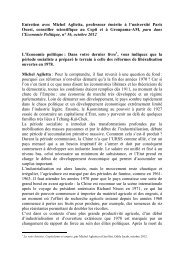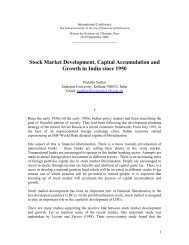Does the Entry Mode of Foreign Banks Matter for Bank ... - EconomiX
Does the Entry Mode of Foreign Banks Matter for Bank ... - EconomiX
Does the Entry Mode of Foreign Banks Matter for Bank ... - EconomiX
You also want an ePaper? Increase the reach of your titles
YUMPU automatically turns print PDFs into web optimized ePapers that Google loves.
through <strong>the</strong> acquisition <strong>of</strong> existing banks. However, in <strong>the</strong> specific case <strong>of</strong> <strong>the</strong> CzechRepublic, <strong>the</strong> prevalent strategy is entry by setting up a branch, which mirrors <strong>the</strong> CzechRepublic's very liberal strategy towards <strong>for</strong>eign branches. In fact, as early as 1992, <strong>the</strong>Act on <strong><strong>Bank</strong>s</strong> already opened <strong>the</strong> door to <strong>for</strong>eign branches by permitting assessments <strong>of</strong><strong>for</strong>eign branch license applications on less restrictive terms than <strong>the</strong> assessment <strong>of</strong> fullbanking license applications by Czech nationals (Simonson, 2001).Affiliates arrive when medium-term portfolio investors acquire a minority <strong>of</strong>shares in banks, which will be sold later. And in order to follow <strong>the</strong> "wait-and-see"approach, a number <strong>of</strong> investment banks as well as some specialized banks adopt <strong>the</strong>representative <strong>of</strong>fice <strong>for</strong>m <strong>of</strong> organization. However, as Konopielko (1999) reports:"…<strong>the</strong>re are a number <strong>of</strong> exceptions to <strong>the</strong>se rules, mostly prompted by riskperception or regulatory barriers. For example, a number <strong>of</strong> <strong>for</strong>eign banks kept<strong>the</strong>ir representative <strong>of</strong>fices in Poland throughout <strong>the</strong> period <strong>of</strong> license moratorium…. and later established subsidiaries based on <strong>the</strong>se <strong>of</strong>fices when it becamelegally possible. Investment in minority shares might on <strong>the</strong> o<strong>the</strong>r hand be causedby a strategy <strong>of</strong> gradual increase <strong>of</strong> commitment in case <strong>of</strong> good financialresults".Areas <strong>of</strong> ActivitiesAs in <strong>the</strong> general case <strong>of</strong> emerging countries, <strong>the</strong> most important areas <strong>of</strong> activity<strong>of</strong> <strong>for</strong>eign banks in CEE are corporate banking and trade services (<strong>for</strong>eign exchangetrading, and trade finance). Interbank operations weigh also heavily in <strong>the</strong>ir balancesheet, both on <strong>the</strong> asset and liabilities sides.Retail activities are perceived as being <strong>the</strong> least important. This means enteringbanks do not adopt a retail strategy in <strong>the</strong>se markets. The main reasons may be <strong>the</strong> lowlevel <strong>of</strong> individual wealth as well as high set-up costs. However, since <strong>the</strong> second half <strong>of</strong><strong>the</strong> 1990s, some <strong>for</strong>eign banks started to realize <strong>the</strong> potential <strong>of</strong> <strong>the</strong> retail market, andbegan to actively participate in this market. As an example, some <strong>for</strong>eign greenfieldbanks in Hungary and Poland <strong>of</strong>fer car financing and lending <strong>for</strong> investing in mutualfunds. As Bonin & Abel (2000) noted, throughout <strong>the</strong> 1990s, <strong>for</strong>eign banks in Hungary-14-


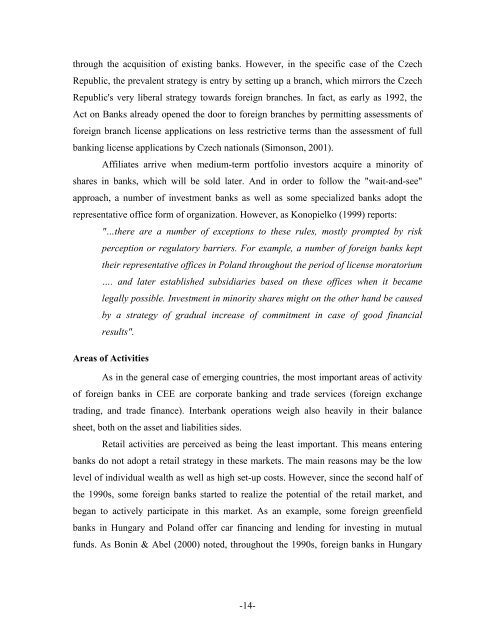
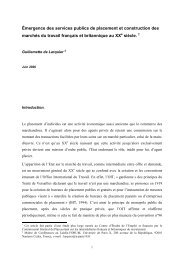
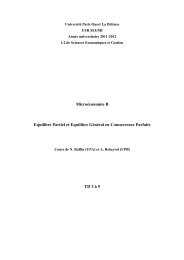

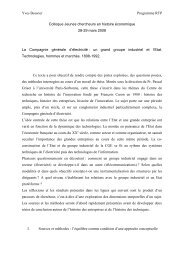

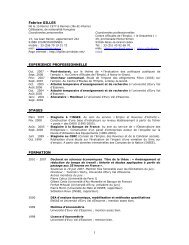

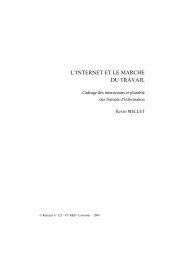
![P * 1 JTZWL_TZY OP^ Sd[Z_Sl^P^ !=m_m]Z^NmOL ... - EconomiX](https://img.yumpu.com/42226403/1/190x143/p-1-jtzwl-tzy-op-sdz-slp-m-mznmol-economix.jpg?quality=85)
